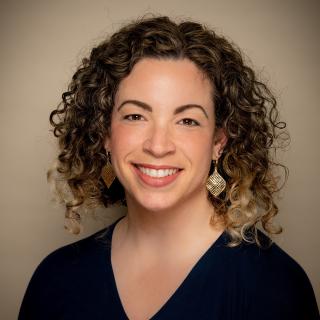
The dramatic changes motherhood imposes onto one's life tend to get all the attention. But partnership and marriage can do a number on you, too. And it's those intimate, umbral spaces of marriage that Seattle playwright Emily Conbere mines in her psychological thriller, Knocking Bird, now playing at West Lenin.
I became interested in Conbere's work when I learned that not only is she a mother and a playwright but that just two weeks before the premiere of Knocking Bird, she gave birth to her second child. She wasn't even sure she would be able to make it to her opening night — it all depended, of course, on whether baby would take a bottle. (Happily, Conbere did make it. Good baby.)
Conbere started writing the play when she was pregnant with her first child, and though she's written other pieces, this is the first full production of her work in Seattle. The play came to the Fremont stage in part thanks to unique support propvided by a new organization called Umbrella Project, which invests in playwrights and the viability of new work through advocacy, collaboration and development. Knocking Bird is the first co-production of Umbrella Project (in association with West of Lenin and Splinter Group; directed by Paul Budraitis and starring Sam Hagen, Angela DiMarco and Alex Matthews).
My husband and I watched Knocking Bird on a date night — a possibly risky occasion for a creepy, marriage mindtrip. The story follows a husband and wife who retreat to the woods for peace and healing after a car accident leaves her body and his mind wrecked. Another character (a stranger comes to town ... ) throws a wrench in the best-laid plans. An obsession with birds provides thematic metaphor; a spooky shed is central but just beyond our grasp; and trips to the 7–11 make you dread a Slurpee like you never before have thought possible. It's funny and sadly haunting.
How does such an eerie tale come out of the wholesome mind of motherhood (since we're playing with archetypes)? I interviewed Conbere to find out what inspires her and how she sustains her creative practice and her family.
 What is your artistic and professional background?
What is your artistic and professional background?
I've been playwriting since high school, but I studied theater in college and got a master's in playwriting from Columbia University. I also have a master's in clinical social work so I try to juggle both professions. Artistically, I found a home in New York with Youngblood at Ensemble Studio Theater, and with a few directors there with whom I began to really develop my work. But it wasn't until I moved to Seattle five years ago that I had the space, money and time to really devote myself to the writing, instead of the producing, or working on connections, or all of the stuff around art that isn't the actual art itself. I think I've written my best plays since living here.
Where did the idea for Knocking Bird come from?
The idea stemmed from my move to Seattle from New York City. It felt like two opposite cultures, and I had a long, lonely period of readjusting myself, and my identity. Knocking Bird started as a 10-minute play that I wrote for Live Girls theater. I then turned it into a one-act play for SOAP Fest. I was pregnant at the time, and a lot of the imagery in the play revolves around pregnancy and the lack of control and vulnerability that comes with pregnancy and having a child. I later expanded the play into a full-length and had a workshop at Seattle Rep as part of the writers group there. When we went into rehearsal for this production under Umbrella Project, I was pregnant with my second child. I think my rewrites were influenced again by my pregnancy.
The story is described as a look at “the strange and uncomfortable ways that couples transform and adapt to each other in order to stay together.” Does it force us to look at things we don't typically want to admit to or think about in our relationships? Does looking at these things help us?
I think a central theme in the play is how individuals work in the confines of a relationship. Some relationships embrace certain parts of the self but may not be able to hold or withstand other parts of self — thus individuals start limiting or editing their self in order to maintain the relationship ... and that can start to show up in strange and uncomfortable ways. The limited self always starts to creep back in. I think it works better the other way around, because it is the self that always wins out in the end, and it is often the relationship that needs to expand. I think looking at these things can be filled with pain and potential loss, but in the end if the relationships has enough flexibility it leads to freedom and beauty and honoring of each other.

I'm interested in how mother artists sustain their creative work amidst the demands of family life. As a writer I struggle with this myself. How does pursuing your art impact the mothering part of your life?
I love being a mother, but continuing to create art in my life allows me to feel fulfilled outside of my marriage and children. It's been difficult; I don't have the time or money to see art/ theater as often as I used to, and it can be very lonely not being as involved in the scene. But there are still times when I'm nursing my daughter or playing with my son when I'll reach for a pen and write down a line or two — and then my whole day and world is changed into one that allows me to step out of my unwashed body and my laundry-filled house and enter a new magical world.
How did Umbrella Project help you, as an artist and a mother, create this project?
Umbrella Project has been so ridiculously supportive of me that I have no words except "I love them" to say over and over again. I was not able to be involved in the rehearsal process much, as I was 36 weeks pregnant and working full-time when it started and ended up giving birth 10 days ago. Yet Norah [Elges], producer and dramaturg, worked very closely with me as a an advocate for the playwright and to make sure that I was in the loop about design elements, casting and the entire process of the play. I've never felt so supported as a writer. Really, they took me from a script that I did not expect to see produced, to a production that I couldn't be more proud of.
Do artist moms generally lack the support they need to create?
For me, the hardest part about being an artist mom is finding the time to create. Artist residencies usually don't accommodate families, and grants take a lot of time and energy. So the question for me becomes whether or not I focus on creating art, or I focus on writing grants to allow me time and money to create art. However, Seattle has offered so much support since my first child was born. Writers groups, working closely with directors, and offering pay-what-you-can nights allow more access to other artists and the art community when you're feeling poor, covered in milk and outside the theater scene.
When you are not creating art, what do you and your family like to do for fun in Seattle? What are some of your favorite spots and activities?
We love to take our kids to see live music, anything from Neil Diamond cover bands at Redmond Town Center to outdoor concerts at Marymoor to live jazz down at the Panama Hotel. Breweries are a great Seattle luxury not to be ignored, and then outside of Seattle (we are renting a house on the Eastside right now close to our jobs) we love the remote-control airplanes at Marymoor park. And going to Twin Peaks land to see the waterfalls and hike.
What's next for you?
I'm currently in the writers group for New Century Theater and am working on a musical about Judee Sill. I'm also writing a play for Custom Made Play Project to be workshopped in 2015. My play The Massive Annual Party is going to be workshopped in Minneapolis this spring, and I'm also writing a book of poems about a museum of children's laughs and cries.











